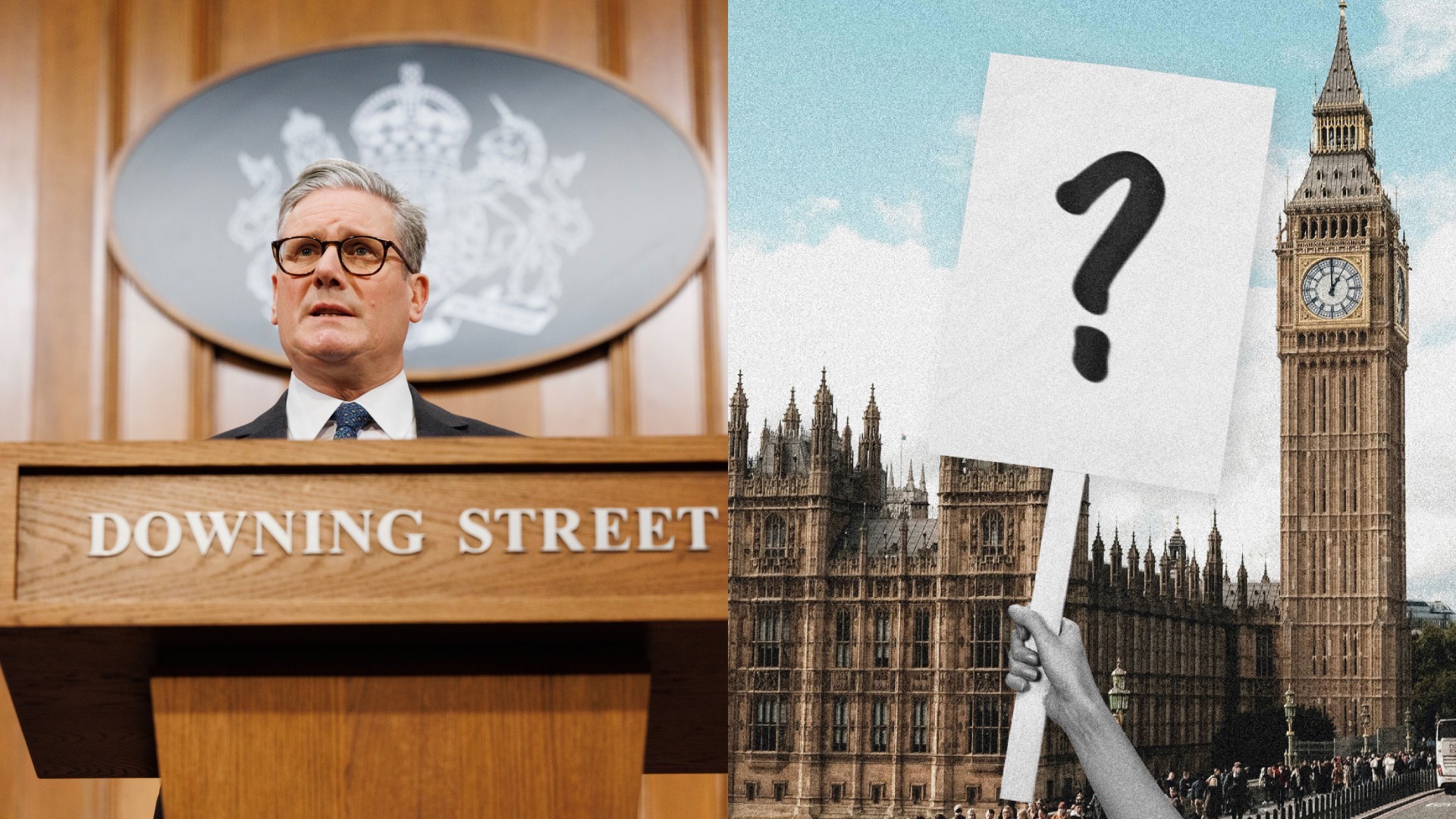Question time: As Labour breaks promises to LGBTQs, who will be our voice in Westminster?
Over the last year, Labour and much of the UK government has shifted to a less supportive position of queer people. Here, Attitude examines the policies of all of the political parties
By Vic Parsons

At Downing Street’s Pride reception in July, prime minister Sir Keir Starmer said attendees were there to “celebrate that truly transformational work” carried out by LGBTQ+ organisations.
“I want you to know that this is a government committed to the fundamental principles of respect, dignity and equality,” Starmer continued, adding that he is “absolutely determined” to improve the lives of LGBTQ+ people “right across Britain”.
The next day, Starmer’s government published updated Relationships, Sex and Health Education (RSE) guidance for schools that was quickly likened to “Section 28 2.0”. According to Labour’s guidance, from September 2026 schools must teach students that there is “significant debate” about trans identities and avoid materials that could “encourage pupils to question their gender”.
Calling the move “a dangerous regression in inclusive education”, Pride in Education responded with an open letter signed by more than 3,500 people. It said that the new guidance “places trans, nonbinary, intersex, asexual and gender non-conforming pupils at risk by erasing their identities from the curriculum and silencing their experiences within schools”.
The updated RSE guidance came one year after Labour’s landslide at the last general election and is the latest in a line of blows to LGBTQ+ people from the government.
Since gaining power, Labour has failed to publish a new HIV Action Plan, despite promising to do so before summer 2025; failed to ban the harmful pseudoscientific practice of so-called ‘conversion therapy’, despite promising to do so in the King’s Speech in July 2024; and been accused by its own MPs of failing to protect LGBTQ+ citizens from violence in British overseas territories.
When it comes to transgender rights, the picture is even bleaker. Last December, Health secretary Wes Streeting made the ban on puberty blockers for trans under-18s permanent. In February, the Guardian reported that a manifesto commitment to reforming the Gender Recognition Act (GRA) had been quietly shelved. And Labour — including Streeting and Starmer — welcomed April’s Supreme Court ruling that under the Equality Act, trans women are not legally women.
It’s unsurprising, then, that Starmer was criticised for daring to hold the Downing Street Pride party — as were the LGBTQ+ leaders who attended.
Labour has historically been the default party for LGBTQ+ people in the UK for partially decriminalising homosexuality, bringing in the GRA, equalising the age of consent, repealing Section 28 and supporting same-sex marriage. But in recent years, the party has shifted direction.
LGBTQ+ voters abandoning Labour
“I felt really dirty voting for Labour,” says Hannah Dingle, a video producer for a disabled arts company. “It’s so hard with how far right Labour is going. We’re seeing the effect on disabled people’s rights, on migrants and LGBTQIA+ people, and the attack on trans rights.” Dingle, who’s now joined the Greens, is among many who’ve abandoned Labour, believing it has broken the promises it made.
In February, grassroots Labour news website LabourList reported that membership is down 11 per cent — equivalent to one Labour member quitting every 10 minutes since the general election. And in March, the media reported that Labour volunteers were leaving “in droves”. Labour won 33.7 per cent of the vote in last year’s election. But over a year later, YouGov statistics on voter intentions from 4 August this year showed that only 21 per cent would vote Labour now.

Maryam Din, director at TransActual, says the party no longer has their vote. “My family have always voted Labour and, coming from a brown Muslim immigrant family, Labour always felt like our home. But continuous bad and racist decision-making makes this choice impossible for us now.” Din says she will vote for the Greens in future, or the new left party if it’s in her area at the next general election. “I simply can no longer justify or stomach voting Labour anymore,” they say. “Old actual socialist Labour is not current-day Labour and hasn’t been for many, many years.”
But without Labour, who in Westminster will speak for LGBTQ+ people?
Not the right
Former Conservative prime minister Theresa May was the first to propose GRA reform and a conversion therapy ban. But in 2024, the Tory manifesto instead promised to “protect single-sex spaces”, introduce trans-hostile RSE guidance and permanently ban puberty blockers. A commitment to a ban on conversion therapy was also omitted from the manifesto, despite the Tories having pledged to ban this over the five years that it was in government. Now, under Kemi Badenoch, the party has completed the about turn on LGBTQ+ inclusion that began under Boris Johnson’s reign.
It’s also highly unlikely that LGBTQ+ people will turn to Reform UK, which vowed to scrap the Equality Act entirely in its manifesto. In May, 10 Reform councils banned Pride flags, and in Reform-controlled Kent, trans books have been banned from the children’s sections of libraries. The only glimmer of hope, it seems, is that a potential 2029 Reform government wouldn’t universally send trans women to men’s prisons, but instead decide where to incarcerate them on a case-by-case basis, the party’s new justice advisor, Vanessa Frake, told The Times in early August.
Tension over trans rights
The Green Party manifesto committed to improving LGBTQ+ lives through reforming the GRA and allowing self-ID, legally recognising nonbinary identities, making tailored provision for queer and trans people in mental-health services, and introducing age-appropriate LGBTQ+ content in RSE education.
“Before the founding of Corbyn and Sultana’s new party, my vote was going to go to the Greens,” says Nic Crosara, deputy editor at DIVA magazine. “I loved seeing [former] co-leader Carla Denyer’s powerful speech at the Bristol rally following the Supreme Court ruling on trans rights.”
Division continues within the Green Party, which has been plagued by gender-critical activists stirring up tensions within the party — most prominently, former deputy leader Shahrar Ali, who this year lamented to the Telegraph: “Gender ideological insanity has accelerated to such a degree that, year on year, scores of gender critical activists have now been persecuted or purged out of the [Green] party for wrongthink [sic].”
In 2021, Siân Berry quit as Greens co-leader over conflict with Ali about trans rights (Berry did not respond to Attitude’s request for comment). Ahead of local elections this year, Denyer denied that a split remains within the Greens over trans rights, telling Sky News: “Green Party policy is clear that trans women are women, trans men are men, and non-binary identities exist and are valid.”
However, the perception that the Greens aren’t united behind trans people persists. “The Green Party as a whole have been vague on certain trans and queer issues,” says Crosara. The Green leadership elections could change that. In June, now-Green Party leader Zack Polanski told Novara Media: “What I would say to anyone who says, ‘Just focus on the economy, don’t worry about trans people and migrants’ [is] ‘Well, what are we transforming the country for?’
“I don’t think [trans people] want to be put front and centre of anything. I think they just want to be allowed to pee in peace.”
Walking the walk
In December 2024, the Green Party joined the Liberal Democrats and the SNP to show their opposition to Labour’s permanent ban on puberty blockers for trans under-18s, releasing a statement that called it an “incredibly distressing and dangerous” decision that puts “thousands of young trans people at immense risk”.
“The Lib Dems have always been strong supporters of LGBTQIA+ communities,” says Charley Hasted, co-chair of the LGBT+ Lib Dems. “We just passed a new policy where we spent a year working to make it the most comprehensive policy of any UK party on LGBTQIA+ rights. A trans-inclusive ban on conversion therapy, ending detention of LGBT+ asylum seekers, inclusive sex education, equalities training for health and social care staff.”

It’s not only the Lib Dems themselves who believe they are the party that best represents LGBTQIA+ voters. Councillor Zoë Hughes, at Exeter City Council, quit the Labour Party to sit as an independent at the start of this year over Labour’s puberty blockers ban. “On a national level, I think the only party that is walking the walk when it comes to LGBTQIA+ rights are the Liberal Democrats,” Hughes tells Attitude.
After the Supreme Court ruling in April this year, Hughes proposed a trans and nonbinary inclusion motion, which passed with an overwhelming majority, including being voted for by the local Reform councillor. Their motion was seconded by a Lib Dem, and the Lib Dems have been sending resources to local members to help them pass similar motions in other areas. “The Lib Dems at the moment are the ones putting pens to paper and trying to get motions through,” says Hughes.
One resounding criticism of the Lib Dems over the years has been a perception of fence-sitting. Responding to this, the party’s Liverpool City council leader — and acclaimed LGBTQ+ political ally — Carl Cashman tells Attitude this is “an easy criticism” to make, but that doesn’t make it true. “When it comes to issues that are fundamental to morality, we don’t sit on the fence,” he says. “We’ve been really powerful on the issue of Israel-Palestine, on LGBTQIA+ rights and on other things such as the scandal with the water companies.”
A party without a name
In July, Zarah Sultana MP announced she was quitting Labour after 14 years to start a new party with Jeremy Corbyn. “In 2029, the choice will be stark: socialism or barbarism,” she wrote on Instagram. A month later, Corbyn posted his own statement on the social media platform, claiming the proposed new party would become “an unstoppable movement for social justice, equality and peace”.
More than 600,000 people have signed up to join the new party. But will it be a new home for LGBTQ+ communities? Some queer voters are already onboard. “Both Corbyn and Sultana have been outspoken advocates for LGBTQIA+ rights, and have been vocal about trans rights as well,” says Crosara. “They are also advocates for improving things which impact everyone, but would also greatly benefit our community, such as healthcare.”
Councillor Hughes is also “really excited” by the prospect. “I would love to see them succeed,” says Hughes. “I think it’s unlikely they will, because we’re still [using the electoral voting system of] First Past the Post. But I am loving the idea of them being on the opposition benches. The sooner we get rid of [First Past the Post], the sooner politics becomes better for LGBTQIA+ people.”

It’s impossible to know definitively where the proposed new party will stand on LGBTQ+ rights until it has formed and announced a direction (Sultana, Corbyn and the four other MPs in the Independent Alliance, a group of six independent MPs in the House of Commons that was formed last September, did not respond to requests for comment).
Jamie Strudwick — who will remain as co-chair of Pride in Labour until February following his resignation from this role and as a member of the Labour Party in early August — told Attitude before his resignation that while many people are leaving Labour for the new left party or the Greens, he doesn’t see either of them as “a viable alternative just yet”. Of Corbyn and Sultana, Strudwick says: “We know that they’re both pro-trans, but until I personally see tangible evidence from them about what they’ll do for the community I don’t think they’re necessarily a safe bet.”
Cashman is also unconvinced. “I’m pretty sure that some of the people that they’re thinking about taking into that party are not good on LGBTQIA+ rights,” he says. “I think that Corbyn is, but some of those other Independent MPs that sit alongside Corbyn have got some pretty hardcore right-wing religious views. What I think the LGBTQIA+ community needs at the moment are people who are going to fight and be on their side. People who are also going to be reasonable about it, and make careful, considered arguments.”
Turning the ship around
With Labour just a year into its five-year term, many wonder whether there is time for the party to rebuild trust when it comes to LGBTQ+ votes. “At the moment, you cannot say that the government is doing its best job for the LGBTQIA+ community,” a spokesperson for Labour for Trans Rights told Attitude. “We do have time to turn the ship around and I really do hope we will, but at the moment the party is going in the wrong direction.”
Bringing in the conversion therapy ban, an HIV Action Plan and better, trans-inclusive RSE guidance for schools would make a difference — as Starmer himself said at the Downing Street Pride party: “There is always more work to do.” But strikingly, party activists think those things are unlikely to change — unless Starmer goes.
“We’re not seeing any appetite from the government to make those changes or to sit down with trans people to discuss these topics,” says Strudwick. “I think we would see significant improvements with a new leader. I think Keir Starmer has caused far too much damage and he’s eroded too much trust in the party.
“To put it bluntly, it’s time for a significant change within the Labour Party.”
This feature first appeared in issue 366 of Attitude magazine, available to order here, and alongside 15 years of back issues on the free Attitude app.
